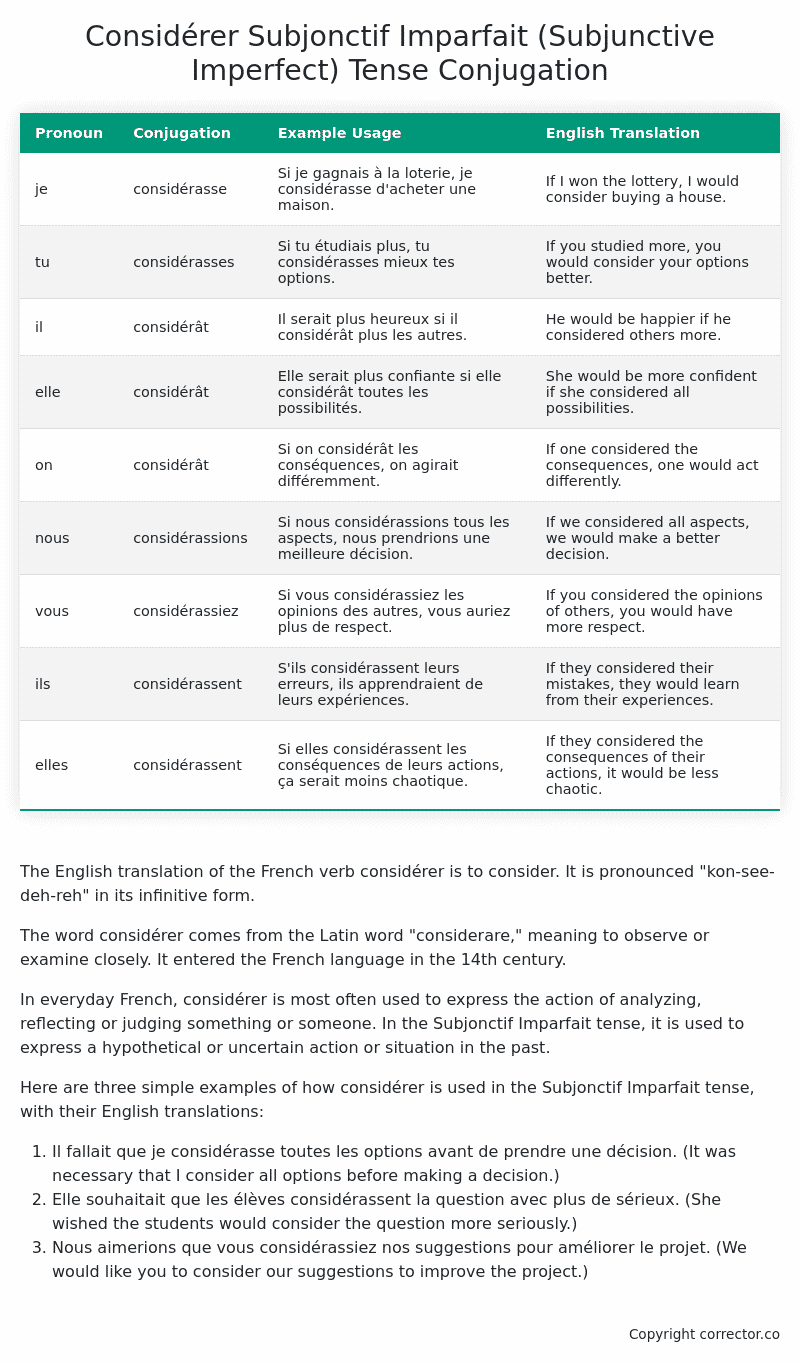Subjonctif Imparfait (Subjunctive Imperfect) Tense Conjugation of the French Verb considérer
Introduction to the verb considérer
The English translation of the French verb considérer is to consider. It is pronounced “kon-see-deh-reh” in its infinitive form.
The word considérer comes from the Latin word “considerare,” meaning to observe or examine closely. It entered the French language in the 14th century.
In everyday French, considérer is most often used to express the action of analyzing, reflecting or judging something or someone. In the Subjonctif Imparfait tense, it is used to express a hypothetical or uncertain action or situation in the past.
Here are three simple examples of how considérer is used in the Subjonctif Imparfait tense, with their English translations:
- Il fallait que je considérasse toutes les options avant de prendre une décision. (It was necessary that I consider all options before making a decision.)
- Elle souhaitait que les élèves considérassent la question avec plus de sérieux. (She wished the students would consider the question more seriously.)
- Nous aimerions que vous considérassiez nos suggestions pour améliorer le projet. (We would like you to consider our suggestions to improve the project.)
Table of the Subjonctif Imparfait (Subjunctive Imperfect) Tense Conjugation of considérer
| Pronoun | Conjugation | Example Usage | English Translation |
|---|---|---|---|
| je | considérasse | Si je gagnais à la loterie, je considérasse d’acheter une maison. | If I won the lottery, I would consider buying a house. |
| tu | considérasses | Si tu étudiais plus, tu considérasses mieux tes options. | If you studied more, you would consider your options better. |
| il | considérât | Il serait plus heureux si il considérât plus les autres. | He would be happier if he considered others more. |
| elle | considérât | Elle serait plus confiante si elle considérât toutes les possibilités. | She would be more confident if she considered all possibilities. |
| on | considérât | Si on considérât les conséquences, on agirait différemment. | If one considered the consequences, one would act differently. |
| nous | considérassions | Si nous considérassions tous les aspects, nous prendrions une meilleure décision. | If we considered all aspects, we would make a better decision. |
| vous | considérassiez | Si vous considérassiez les opinions des autres, vous auriez plus de respect. | If you considered the opinions of others, you would have more respect. |
| ils | considérassent | S’ils considérassent leurs erreurs, ils apprendraient de leurs expériences. | If they considered their mistakes, they would learn from their experiences. |
| elles | considérassent | Si elles considérassent les conséquences de leurs actions, ça serait moins chaotique. | If they considered the consequences of their actions, it would be less chaotic. |
Other Conjugations for Considérer.
Le Present (Present Tense) Conjugation of the French Verb considérer
Imparfait (Imperfect) Tense Conjugation of the French Verb considérer
Passé Simple (Simple Past) Tense Conjugation of the French Verb considérer
Passé Composé (Present Perfect) Tense Conjugation of the French Verb considérer
Futur Simple (Simple Future) Tense Conjugation of the French Verb considérer
Futur Proche (Near Future) Tense Conjugation of the French Verb considérer
Plus-que-parfait (Pluperfect) Tense Conjugation of the French Verb considérer
Passé Antérieur (Past Anterior) Tense Conjugation of the French Verb considérer
Futur Antérieur (Future Anterior) Tense Conjugation of the French Verb considérer
Subjonctif Présent (Subjunctive Present) Tense Conjugation of the French Verb considérer
Subjonctif Passé (Subjunctive Past) Tense Conjugation of the French Verb considérer
Subjonctif Imparfait (Subjunctive Imperfect) Tense Conjugation of the French Verb considérer (this article)
Subjonctif Plus-que-parfait (Subjunctive Pluperfect) Tense Conjugation of the French Verb considérer
Conditionnel Présent (Conditional Present) Tense Conjugation of the French Verb considérer
Conditionnel Passé (Conditional Past) Tense Conjugation of the French Verb considérer
L’impératif Présent (Imperative Present) Tense Conjugation of the French Verb considérer
L’infinitif Présent (Infinitive Present) Tense Conjugation of the French Verb considérer
Struggling with French verbs or the language in general? Why not use our free French Grammar Checker – no registration required!
Get a FREE Download Study Sheet of this Conjugation 🔥
Simply right click the image below, click “save image” and get your free reference for the considérer Subjonctif Imparfait tense conjugation!

Considérer – About the French Subjonctif Imparfait (Subjunctive Imperfect) Tense
Formation
Common Everyday Usage Patterns
Interactions with Other Tenses
Subjonctif Présent
Indicatif Passé Composé
Conditional
Conditional Perfect
Summary
I hope you enjoyed this article on the verb considérer. Still in a learning mood? Check out another TOTALLY random French verb conjugation!


